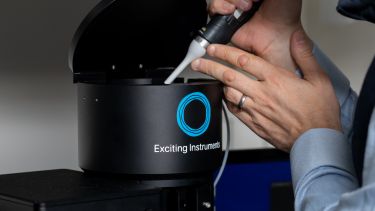Making molecular research accessible across the world
The study of single molecules is fundamental for developing new treatments but expensive equipment creates barriers for research. One spinout company is championing open research with cheap, user-friendly tools to make molecular research accessible across the world.

Understanding how molecules such as DNA and proteins interact with each other is essential to the development of new drugs, vaccines and treatments. In particular, knowing the size and shape of a single molecule allows researchers to understand the behaviour of that molecule better.
However, studying the movement of a single molecule requires a special type of instrumentation in a specific laboratory, both of which are high-cost and often outside the budget of a typical research project. This equipment, as well as inaccessible data processing software, is currently only available at a few specialist labs around the world.
This creates setbacks for biological researchers and can hinder the investigation of new processes, such as DNA damage, that could eventually lead to better therapies for diseases such as cancer.
Dr Timothy Craggs is a Senior Lecturer in Biophysics and Departmental Director of Research and Innovation at the University of Sheffield. He is an internationally renowned expert in the development and application of the study of single molecules.
In a joint venture with Bulldozer Limited, a software and technology incubator based in Sheffield, Tim and his team of scientists and students founded Exciting Instruments Ltd. Exciting Instruments is a spinout company that specialises in making single molecule research and data analysis more accessible.
The team from Sheffield designed and built a specialist microscope that users can tailor to their research needs. The instrument also hosts cloud-based data software that allows users to track the progress of an experiment on their phone in real time. It was created to help users move quickly from experiment to discovery without compromising on accuracy or requiring separate tools.
“Exciting Instruments is a true partnership of science and software. While we provide the expertise in single molecules, Bulldozer Ltd has been essential to the speed and the success of the spinout so far through their business acumen and support, particularly in the development of our cloud data analysis and visualisation platform” says Dr Timothy Craggs.
Understanding single molecule spectroscopy (SMS)
Spectroscopy is the study of how matter absorbs or sends out light and other radiation.
Single molecule spectroscopy (SMS) investigates the properties of individual molecules through their reaction to light. SMS techniques have revolutionised the ability to understand the behaviour of single molecular structures and allow scientists to study individual molecules rather than thousands at once in a large sample. This investigation is vital for understanding biological processes such as DNA damage detection that could lead to improved therapies for diseases.
Although SMS techniques are vital for discoveries, researchers across the world face difficulties accessing the instrumentation and specialist labs required to carry out new studies. In 2016, The Craggs Lab, an interdisciplinary lab based in the Department of Chemistry at the University of Sheffield, faced this exact problem. The team of students, led by Tim, were unable to purchase the commercial equipment required for their studies and decided to build their own. The interdisciplinary team designed and built a microscope that was robust but also cheap enough to be accessible for more users.
In 2020, the team published a paper in Nature Communications with detailed instructions on how to build the effective SMS microscope: the single-molecule Forster Resonance Energy Transfer box (smfBox). The paper includes all the information required for users to purchase and fabricate the components for the tool, with instructions on how to build it and the software required to use it.
The piece of kit would usually cost around £400,000 to buy, but the blueprints created by Tim’s team gives labs all the information needed to build the instrument themselves at a cost of ~£40,000.
As a result of this paper, the tool is currently being built in labs across the world, including in the US, Denmark and South Korea.
The team were recognised for their work in open research and the smfBox was awarded the Open Research Prize in 2021.
Championing open research
Following the success of the original smfBox, Tim founded Exciting Instruments: a spinout company that simplifies the procedure for science discoveries to the broadest possible user base.
The spinout received funding made available through the University of Sheffield’s IP Development and Commercialisation (IPDaC) and Connecting Capability (CCF) funding streams.
Exciting Instruments was founded on the basis of making biology available and accessible by the largest possible number of people around the world, rather than solely SMS experts.
The company’s first product is the EI-FLEX system, a modular instrument that allows users across the world to choose the right tools required for their specific research. The instrument is equipped with a software that provides real-time data visualisations and complex analysis of molecules (such as DNA and RNA).
Based on the original smfBox, the tool was developed to make discoveries easier in biophysics, life sciences, drug development and medical diagnostics. Compared with the initial smfBox, the EI-FLEX is an improved instrument that is a compact 600mm x 600mm square and around 500mm in height.
With the modular element, researchers can expand and build on the instrument as their research grows rather than having to purchase new instruments with specific functions. This system has proven a key tool in a number of academic collaborations, such as with Dr Alison Twelvetrees at the University of Sheffield and Prof Mark Leake at the University of York, where it has been used to understand a range of biological processes and functions.
“The instrument can be used by any user undertaking structural biology research, rather than solely for single molecule experts. The EI-FLEX system supports all types of biology researchers to understand the dynamics of their molecules in a solution one molecule at a time, rather than having to collaborate with an external lab or centre. It just makes the process easier for everyone” explains Dr Tim Craggs.
The EI-FLEX automatically saves metadata and raw data in a file format so users can analyse their own results, and the results of others, with a range of compatible software solutions.
"We’re going paper-free and bringing science research into the 21st century by encouraging researchers to share live data from their experiments with each other. By sharing a single link, users can access live information from an experiment and respond to it quickly. Users can also analyse data from previous experiments to understand the robustness of the experiment process and play with the parameters of the research" he adds.
The ethos of open research is at the core of Exciting Instruments. The spinout continues to publish papers on accessible servers and establish open data analysis through standardised formats.
Written by Alina Moore, Research Communications Coordinator




